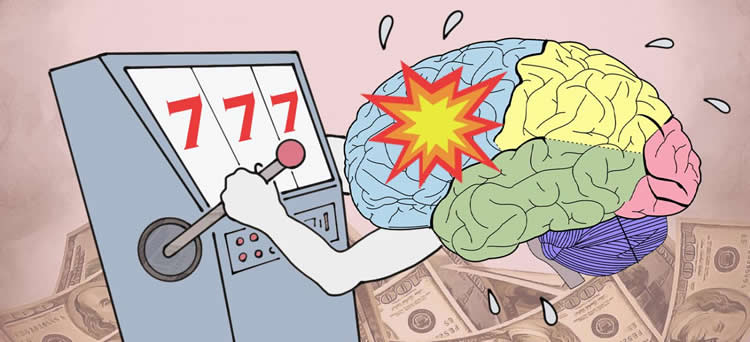Summary: A new neuroimaging study finds those with gambling addition have a poor ability to assess and adapt to high risk situations.
Source: Kyoto University.
You’ve been losing all night, and now another bad hand. So why raise?
Gambling addiction is a mental disorder characterized by excessive risk-taking despite negative results. Scientific studies using functional MRI — fMRI, a method of looking at active areas of the brain — have previously shown that addicts have altered activity in brain regions related to risk and reward, making them prone to prefer risky choices.
New fMRI research conducted at Kyoto University has now found another explanation for the unhealthy bent: addicts have a poor ability to assess and adapt to high risk situations. The study appeared recently in Translational Psychiatry.
“We noticed that gambling addicts also have higher levels of mood and anxiety disorders,” says lead author Hidehiko Takahashi. “Hence pleasure may not be the main goal, but rather an inability to properly recognize risk and adapt accordingly.”
We all make action decisions by evaluating the likelihood of success based on the level of tolerable risk. We then make adjustments based on prevailing circumstances.
“For example, if you are losing in the first half of a soccer match, you will likely prefer a strong defense while pushing your attackers forward,” continues Takahashi, “However, if you are losing at the end of the second half, you may choose to forgo defense in favor of an all-out attack, because you would lose otherwise.”
Addicts, on the other hand, are inclined toward unnecessarily risky action, demonstrating a defect in risk assessment and adaptation.

Flexibility in risk-taking between addicts and non-addicts was determined through a series of gambling tasks, requiring participants to earn a certain amount of credits. Addicts were found to go with a risky strategy even if that choice was sub-optimal.
“We observed diminished activity in the dorsolateral prefrontal cortex, a region of the brain involved in cognitive flexibility,” concludes Takahashi. “This indicates that these subjects lack an ability to adapt their behavior to the risk level of the situation.”
The team hopes that their findings will contribute to a better understanding of the nature of gambling addiction, and eventually to the development of new methods of treatment.
Funding: Japan Society for the Promotion of Science, Japan-US Brain Research Cooperation Program, Takeda Science Foundation, Japan Agency for Medical Research and Development (AMED) funded this study.
Source: David Kornhauser – Kyoto University
Image Source: NeuroscienceNews.com image is credited Kyoto University/Eiri Ono.
Original Research: Full open access research for “Deficit of state-dependent risk attitude modulation in gambling disorder” by A Fujimoto, K Tsurumi, R Kawada, T Murao, H Takeuchi, T Murai & H Takahashi in Translational Psychiatry. Published online April 4 2017 doi:10.1038/tp.2017.55
[cbtabs][cbtab title=”MLA”]Kyoto University “High Stakes, High Risk, and a Bad Bet: Inside the Brains of Gambling Addicts.” NeuroscienceNews. NeuroscienceNews, 14 April 2017.
<https://neurosciencenews.com/gambling-addiction-neuroimaging-6413/>.[/cbtab][cbtab title=”APA”]Kyoto University (2017, April 14). High Stakes, High Risk, and a Bad Bet: Inside the Brains of Gambling Addicts. NeuroscienceNew. Retrieved April 14, 2017 from https://neurosciencenews.com/gambling-addiction-neuroimaging-6413/[/cbtab][cbtab title=”Chicago”]Kyoto University “High Stakes, High Risk, and a Bad Bet: Inside the Brains of Gambling Addicts.” https://neurosciencenews.com/gambling-addiction-neuroimaging-6413/ (accessed April 14, 2017).[/cbtab][/cbtabs]
Abstract
Deficit of state-dependent risk attitude modulation in gambling disorder
Gambling disorder (GD) is often considered as a problem of trait-like risk preference. However, the symptoms of GD cannot be fully understood by this trait view. In the present study, we hypothesized that GD patients also had problem with a flexible control of risk attitude (state-dependent strategy optimization), and aimed to investigate the mechanisms underlying abnormal risk-taking of GD. To address this issue, we tested GD patients without comorbidity (GD group: n=21) and age-matched healthy control participants (HC group: n=29) in a multi-step gambling task, in which participants needed to clear ‘block quota’ (required units to clear a block, 1000–7000 units) in 20 choices, and conducted a task-functional magnetic resonance imaging (fMRI) experiment. Behavioral analysis indeed revealed a less flexible risk-attitude change in the GD group; the GD group failed to avoid risky choice in a specific quota range (low-quota condition), in which risky strategy was not optimal to solve the quota. Accordingly, fMRI analysis highlighted diminished functioning of the dorsolateral prefrontal cortex (dlPFC), which has been heavily implicated in cognitive flexibility. To our knowledge, the present study provided the first empirical evidence of a deficit of state-dependent strategy optimization in GD. Focusing on flexible control of risk attitude under quota may contribute to a better understanding of the psychopathology of GDs.
“Deficit of state-dependent risk attitude modulation in gambling disorder” by A Fujimoto, K Tsurumi, R Kawada, T Murao, H Takeuchi, T Murai & H Takahashi in Translational Psychiatry. Published online April 4 2017 doi:10.1038/tp.2017.55






